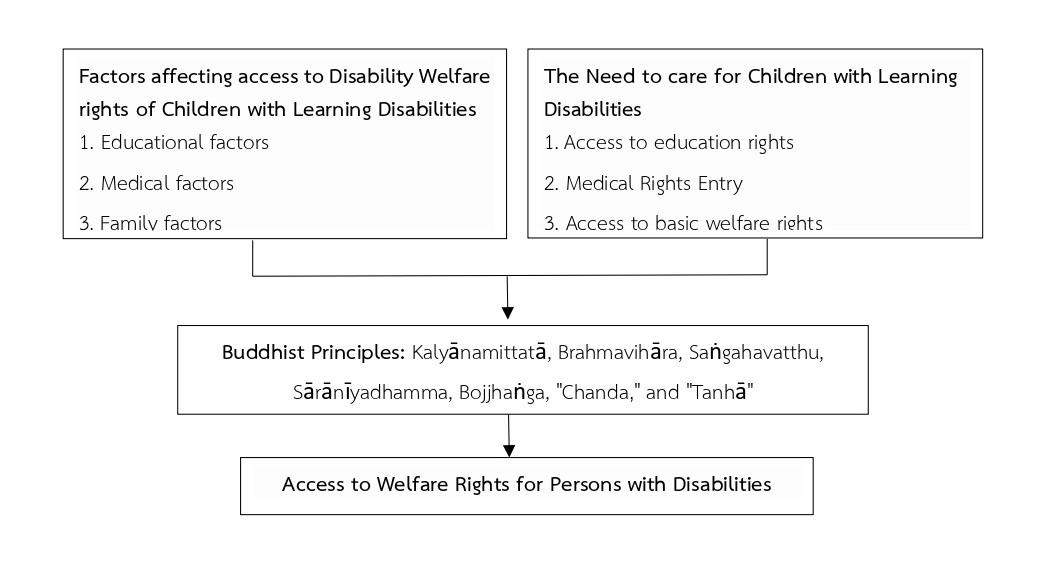INTEGRATING BUDDHIST PRINCIPLES WITH FACTORS AFFECTING ACCESSIBILITY TO DISABILITY WELFARE RIGHTS AND CARE FOR CHILDREN WITH LEARNING DISABILITIES
Keywords:
Children with Learning Disabilities, Welfare Rights of Persons with Disabilities, NeedsAbstract
Background and Objectives: The data in 2020 from the Office of Special Education Bureau, Office of the Basic Education Commission and the Department of Empowerment of Persons with Disabilities revealed that, based on the announcement of the Ministry of Education, there are more persons with disabilities than those with learning disabilities covered under the Persons with Disabilities Empowerment Act B.E. 2550. Therefore, facilitating the identification and support of children with learning disabilities in their access to disability welfare rights enables these children to receive rights tailored to their specific disability type to ultimately promote and develop their potential equally and comprehensively. This research aims to study the factors affecting access to disability welfare rights for children with learning disabilities as assessed by the Ministry of Education, examine the specific caregiving needs of children with learning disabilities, and propose guidelines for promoting and facilitating access to appropriate welfare rights for children with learning disabilities.
Methodology: This qualitative research employed an interview form with the Indexes of Items-Objective Congruence (IOC) equaled to 1.00. In-depth interviews were conducted with four distinct target groups: Ten parents of children with learning disabilities, four medical professionals, four educational professionals, and four informants involved in the field of social welfare for disabled persons. In addition, group discussions were held with ten children with learning disabilities. Both content and inductive analysis were subsequently performed with the perspectives and opinions of the key informants to synthesize the research results.
Main Results: It revealed that the factors affecting the accessibility of welfare rights for children with learning disabilities, as assessed by the Ministry of Education, had encompassed educational, medical, and family factors. The caregiving needs to parents for children with learning disabilities encompassed educational requirements, medical necessities, and the imperative need to uphold fundamental rights.
Involvement to Buddhadhamma: The factors affecting the accessibility of welfare rights for children with learning disabilities as assessed by the Ministry of Education, took on a different perspective in Buddhism. In the context of Buddhism, a truly compassionate society was one where people understood persons with disabilities realistically and were willing to create what was necessary and appropriate for their well-being. Buddhism offered to teach that promoted social support for persons with disabilities, underpinned by principles to affirm and support the inherent value of life for the disabled. These Buddhist principles included Kalyānamittatā, Brahmavihāra, Saṅgahavatthu, Sāraṇīyadhamma, and Bojjhaṅga. Moreover, the caregiving needs of parents for children with learning disabilities within the framework of Buddhism were categorized into two parts: 1) Good or wholesome needs, referred to as "Chanda," 2) Unwholesome needs, known as "Tanhā". Both concepts carried distinct perspectives on the role of desires or needs. However, Buddhism predominantly viewed Tanhā in a negative light, as it could have led to negative consequences when used as a motivator without wisdom to guide it. While Tanhā could have sometimes served as a motivation for action, Buddhism consistently cautioned against its unwise use. The findings indicated that the needs of parents seeking support for children with learning disabilities, particularly about disability registration and access to welfare rights were influenced by both "Chanda" and "Tanhā," which impacted the decision-making process within the system of disability welfare.
Conclusions: It found that factors affecting accessibility to disability welfare rights and care for children with learning disabilities required cooperation among individuals and various agencies such as the Ministry of Education, Ministry of Social Development and Human Security, and the Ministry of Public Health. This collaborative effort was essential in fostering the development of a comprehensive model to care for children with learning disabilities. The integration of Buddhist principles played a pivotal role in this approach. These Buddhist principles included the Four Saṅgahavatthu (Dāna, Piyavācā, Atthacariyā, Samānattatā), The Four Noble Truths (Dukkha, Samudaya, Nirodha, Magga), and the Four Brahmavihāra (Mettā, Karuṇā, Muditā, Upekkhā).
References
Announcement of the Ministry of Education regarding the classification and criteria for persons with disabilities in education B.E. 2552. (2009).
Chanta, S. (2011). Quality of Working Life of Persons with Physical Disabilities through Vocational Training from Vocational Training Centers for Persons with Disabilities. Valaya Alongkorn Review, 1(2), 112-123.
Kantharit, Ch. (2018). Factors Related to Social Welfare Needs of Disabled People in Nonthaburi Province. Journal of Political Science Suan Sunandha Rajabhat University, 1(1), 1-16.
Mahachulalongkornrajavidyalaya University. (1996A). Thai Tripitaka. Bangkok: Mahachulalongkorn rajavidyalaya University Printing Press.
Mahachulalongkornrajavidyalaya University. (1996B). Pali Tripitaka. Bangkok: Mahachulalongkorn rajavidyalaya University Printing Press.
Pavasuthipaisit, Ch., Sringernyuang, L., Dalodom, K. & Siriinta. S. (2016). Analysis of Policy Gaps in Promoting Early Childhood Development in Thailand. Public Health Systems Research Institute.
Phra Brahmagunabhorn (P.A. Payutto). (2013). Dictionary of Buddhism, Complete Dhamma Edition (24th ed.). Buddhist Printing House of the Dharmasapa.
Pijanan, K., Sripraschayanon, S. & Boonim, D. (2021). Developing the Quality of Life according to Buddhist principles of the disabled of the Ward of Vejjaarak Lampang Hospital, Sala Sub-district, Ko Kha District, Lampang Province. Nakhon Lampang Buddhist Journal, 10(1), 1-15.
Riewpaiboon, W., Pavasuthipaisit, Ch. & Sringenyuang, L. (2016). Problems, Needs, and Accessibility to Services for Children with Disabilities in the Community and the Situation of the Rehabilitation Workforce. Health Systems Research Institute (HSRI), Office of the Support Fund, Thai Health Promotion Foundation, Institute for Health Promotion for Persons with Disabilities.
Saksiripho, D. (2020). Development of Screening Instrument for Preschooler at Risk with Dyscalculia. Journal of Education Burapha University, 31(1), 16-28.
Sanigampongsa, P. (2007). Disability issue perceptions: Disability rights and disability as a social problem. NIDA Development Journal, 47(4), 1-47.
Sungsin, S. (2019). Access to the Rights of Disabled Persons under the Empowerment of Persons with Disabilities Act, 2007, in Muang, Phetchaburi District, Phetchaburi. Lawasri Journal, Thepsatri Rajabhat University, 3(2), 71-84.

Downloads
Published
How to Cite
Issue
Section
License
Copyright (c) 2023 Journal of Buddhist Anthropology

This work is licensed under a Creative Commons Attribution-NonCommercial-NoDerivatives 4.0 International License.








